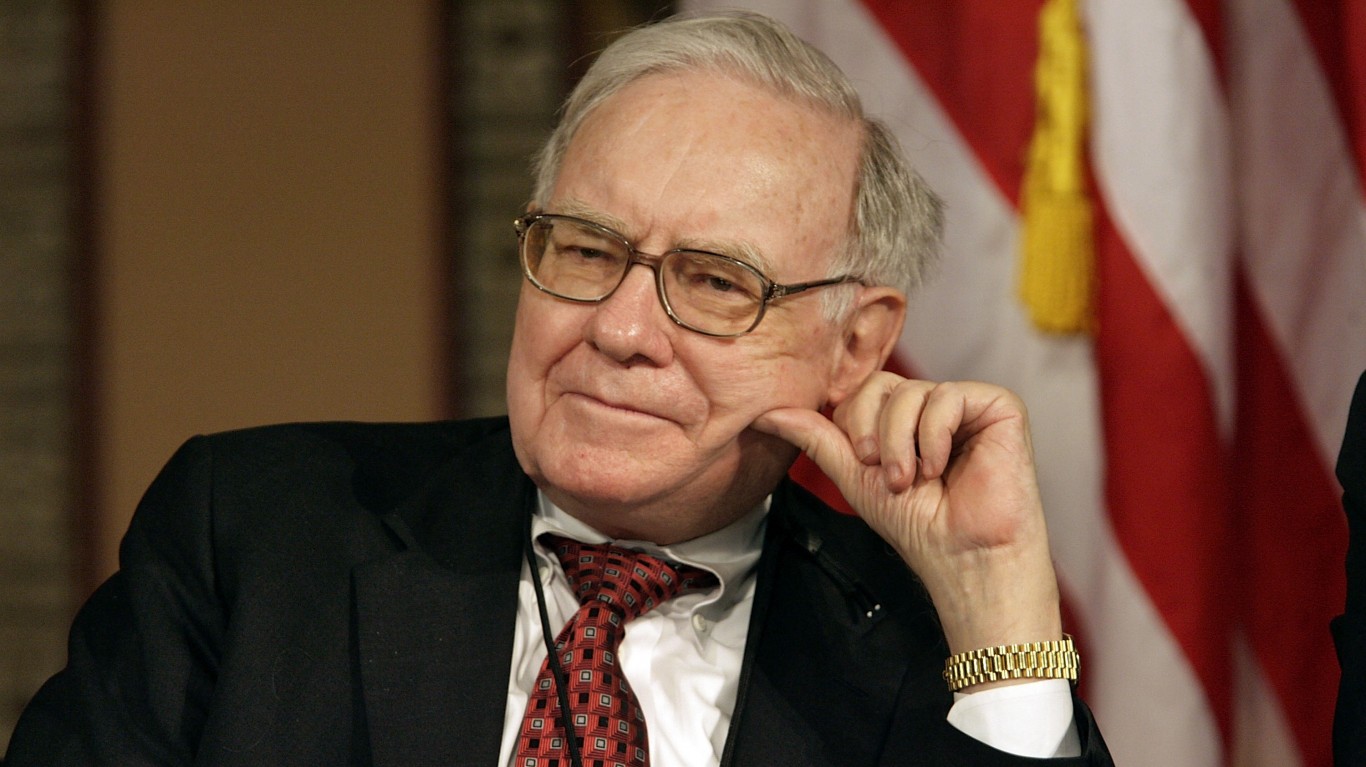
Warren Buffett has been in the news again this week, this time for his major sell-off of Bank of America stock. His company, Berkshire Hathaway, has offloaded $3 billion worth of shares over 9 trading sessions, to widespread speculation about the fate of the company’s remaining $39.5 billion in BOA stock. But while Buffett deals in the billions, his approach to successful investing, and to success in life in general, is accessible to everyone. From sources like Goodreads and BrainyQuote, we’ve selected 10 of Buffett’s most quotable quotes on success to inspire and challenge you, whether you’re trucking along toward your first billion or content with the $10 in your pocket.
24/7 Wall St. Insights
- Warren Buffett’s practical and memorable advice applies not only to becoming a successful investor but to achieving your goals in other areas of life as well.
- Key ideas in his approach to success are to be patient, think long-term, and not pursue the latest fads.
- Buffett advises buying good stocks and holding them for the long-run. Want to get started on that advice? Check out our free report: 2 Dividend Legends To Hold Forever
Why Listen to a 93-Year-Old Man?

We live in a youth-oriented culture that often dismisses older people with a sneering, “Ok, Boomer.” At 93, Warren Buffet’s kids are Boomers; he’s too old to be part of that generation. So why listen to what he has to say?
- He is still alive after almost a century. Wouldn’t you like to know how?
- With a net worth of $135 billion dollars, he is the 10th-richest person in the world.
- He turned Berkshire Hathaway into a nearly $1 trillion company with 400,000 employees.
- Despite his wealth, he has remained a down-to-earth guy who hasn’t forgotten his roots. He still lives in the same house he bought for $31,500 in his hometown of Omaha, NE.
- He is a legendary philanthropist who has convinced Bill Gates and other billionaires to pledge to give away half their fortunes to world-changing causes.
This is a picture of a successful man who hasn’t let wealth fundamentally change him in negative ways—not a bad example to consider. So here are 10 of his best pearls of wisdom about what it takes to be a success.
1. Say “No”

- “The difference between successful people and really successful people is that really successful people say no to almost everything.”
Decision fatigue is real. Living in a society with so many choices, if we give our full attention to each one we won’t even be able to make it out the door in the morning. This is especially true for successful people who draw others to themselves. And you’ll be seen as successful even if you don’t have much money, but have your life reasonably together and have a positive attitude. Saying “no” isn’t cruel and heartless. It’s just making other people aware of whether you are available or are not for a particular opportunity. Get comfortable stating that as a fact and sticking to it, and others will grow to respect your decisions and take you at your word. And if they don’t, well there are 8 billion other people in the world to connect with, right?
2. Guard Your Reputation

- “It takes 20 years to build a reputation and five minutes to ruin it. If you think about that, you’ll do things differently.”
It’s not hard to find reasons to be cynical. Everyone from our parents to religious leaders to politicians has let us down at one time or another. And with so many people curating an artificial image of their lives for social media, it’s easy to think everyone is fake. This makes it more important than ever for you and me to be people of integrity—the same in private as the image we show people in public. No one is perfect. It’s often possible to recover from a lapse in judgment, but not always. If it is possible, it will take a long time to rebuild trust and overcome the connection in people’s minds between you and what you did.
3. Think Long-Term

- “Someone’s sitting in the shade today because someone planted a tree a long time ago.”
One of the discouraging things about working hard toward your dreams is that you don’t always accomplish them in your lifetime. Take the Laura Ingalls Wilder family, for example, of Little House on the Prairie fame. Charles Ingalls traveled the Midwest with his family trying to get a prosperous homestead started. Poor harvests, locusts, sickness, and death plagued the family to the point that they were never as materially successful as Charles wanted. Yet, many years later his daughter Laura would write lovingly of her parents and appreciatively of the life of hardship and love they lived as a family. Even if the “tree” you leave behind is not a financial one, you can create a legacy that will serve future generations of your family well.
4. Be Patient

- “The stock market is a device for transferring money from the impatient to the patient.”
Buffett is famous for his patient, slow approach to investing. He advises choosing stocks that you’d be happy to hold for 10 years if all trading on the market stopped today. It’s a mistake in investing and in life in general to think we always have to be doing something. Your garden won’t grow well if you keep pulling up the plants to look at the roots and moving them somewhere else. Neither will your financial investments or your relational investments. You’ll want to learn to leave things alone until you see the fruit of your patience.
5. Time, Discipline, Patience

- “Successful investing takes time, discipline, and patience. No matter how great the talent or effort, some things just take time: You can’t produce a baby in one month by getting nine women pregnant.”
Not only is patience a necessary prerequisite for success, but time and discipline are as well. All three are connected, but disciple stands out from the other two as something that is an action you can take. It takes discipline not to tinker with your investments when they just need time to grow. But it also takes discipline to do the hard work of continually learning so that you can make wise future investments even as you leave your current ones alone. Friendships and family benefit from this approach as well. Spreading yourself too thin doesn’t make more people feel loved. It makes the few people who truly do love you feel less loved.
6. Don’t Seek the Spotlight

- “Beware the investment activity that produces applause; the great moves are usually greeted by yawns.”
Entrepreneurial success stories often include dramatic opportunities that seem to fall into someone’s lap. A momentary investment in cryptocurrency or a strategic stock, purchased at just the right time and sold fortuitously before the bottom falls out of the market. These spectacular stories are few and far between in real life and don’t really require much talent on the part of the investor. They happened to be in the right place at the right time, and with the resources to jump on an opportunity. Making slow, consistent moves that produce steady, though unexciting gains requires much more discipline, and is far more likely to produce success.
7. Choose Simplicity

- “The business schools reward difficult complex behavior more than simple behavior, but simple behavior is more effective.”
There are any number of practical applications for Buffett’s advice to choose the simple path. Take saving for retirement, for example. If you love investing and are willing to consume information about it voraciously the way Buffett has spent a lifetime doing, then you might be wildly successful at choosing individual stocks to create a profitable portfolio. Otherwise, you may be far better off putting your money into diversified mutual funds and letting someone else do all that research, while you pull in gradual, reliable gains over time. In relationships, treat other people the way you want to be treated, apologize when you offend someone, set boundaries and stick to them without getting emotional. Hard to do, but not exactly rocket science. What area of your life do you need to simplify?
8. Temperament Beats IQ

- “Success in investing doesn’t correlate with IQ … what you need is the temperament to control the urges that get other people into trouble in investing.”
In this quote, Mr. Buffett doesn’t give too many specifics of what constitutes a temperament that leads to success, but he does say it includes self-control. In a more general sense, think about situations when you and others become emotional, and whether that emotion leads to good decisions. Fear, anger, and jealousy can get us into trouble fast, but so can infatuation, over-optimism, and excitement. When our minds are overwhelmed with strong emotions, the thinking centers of our brains don’t function as reliably as they should. Breathe, settle down, and think long and hard before making significant decisions. And if you’re going to lose out on an opportunity because you have to decide now, more likely than not you’ll be better off in the long run if you just let that one go.
9. Don’t Pursue Quick Profits

- “Keep things simple and don’t swing for the fences. When promised quick profits, respond with a quick ‘no.'”
Cryptocurrency is a recent example of what amounts to a “get rich quick” scheme that for many people turned into a “get poor quick” scheme. We can debate the merits of crypto all day, but it’s undeniable that a lot of people jumped into it when they heard that others were making money hand-over-fist. Here’s the thing. By the time something like this lands on the radar of a regular person, that investment has likely peaked and is now well over-valued for what it is. That’s when astute investors are cashing in their virtual chips and taking real money to the bank, not pouring more into it. While Buffet’s Berkshire Hathaway also invested in crypto, the vast majority of its portfolio is in solid companies producing products and services that are going to be in demand for a long time. The lesson? Dabble in those areas for fun if you want, but invest for your future in investments that have a future.
10. Money Won’t Buy Character

- “Of the billionaires I have known, money just brings out the basic traits in them. If they were jerks before they had money, they are simply jerks with a billion dollars.”
There are over 3,000 billionaires in the world. How many of even the top 10 can you name? People like Elon Musk, Jeff Bezos, Mark Zuckerberg, and Bill Gates are in the public eye because they’ve done things that affect everyone’s life. And some of them are grabbing headlines by going into space or saying political things. No offense, but that doesn’t mean that any of them are people you would actually want to have as friends or neighbors if they weren’t sitting on a mountain of money.
Yet who doesn’t have a story of a real-life person they have known who would give you the shirt off his back or their last dollar? A grandma who patiently endured a life of hardship but kept her sense of humor and built a loving family? A co-worker who made every day at a soul-crushing job a little more bearable? So in the end, would you rather be the richest person in the cemetery or the most beloved person in the cemetery? And will the way you spend your time and energy get you there, or is it time to align with your priorities? With hard work and a lot of luck, maybe, like Warren Buffett, you can do both.
The Average American Has No Idea How Much Money You Can Make Today (Sponsor)
The last few years made people forget how much banks and CD’s can pay. Meanwhile, interest rates have spiked and many can afford to pay you much more, but most are keeping yields low and hoping you won’t notice.
But there is good news. To win qualified customers, some accounts are paying almost 10x the national average! That’s an incredible way to keep your money safe and earn more at the same time. Our top pick for high yield savings accounts includes other benefits as well. You can earn up to 3.80% with a Checking & Savings Account today Sign up and get up to $300 with direct deposit. No account fees. FDIC Insured.
Click here to see how much more you could be earning on your savings today. It takes just a few minutes to open an account to make your money work for you.
Our top pick for high yield savings accounts includes other benefits as well. You can earn up to 4.00% with a Checking & Savings Account from Sofi. Sign up and get up to $300 with direct deposit. No account fees. FDIC Insured.
Thank you for reading! Have some feedback for us?
Contact the 24/7 Wall St. editorial team.





